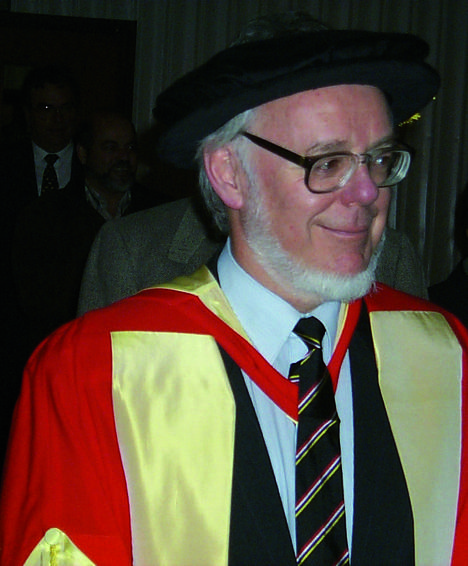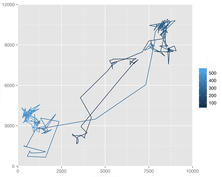Publication trimestrielle du Laboratoire
d'analyse et d'architecture des systèmes du CNRS

Brian Randell est professeur à l’université de Newcastle-upon- Tyne, au Royaume-Uni. Sa première rencontre avec le LAAS, lors d’un congrès à Toulouse organisé par le laboratoire en 1978, a été le point de départ d’une complicité scientifique féconde qui perdure depuis trente ans. Entre la création, dès après ce premier contact, d’un groupe de travail de l’IFIP(1) « Sûreté de fonctionnement et tolérance aux fautes », et l’actuelle collaboration au sein du réseau européen d’excellence coordonné par le LAAS, ReSIST(2), de nombreux succès sont à l’actif de ce tandem intellectuel. Particulièrement, la publication, décisive dans le domaine de la sûreté de fonctionnement informatique, d’une définition classifiée, assortie de sa terminologie, de ses concepts fondamentaux.
It is a great privilege to be invited to contribute to the special edition of the LAAS Newsletter marking the Laboratory’s 40th Anniversary. I have had many fruitful and pleasant interactions with LAAS, and in particular the TSF Group(3), over many years. I am not quite sure when these began - I believe my first visit to Toulouse was for FTCS-8, the Eighth IEEE Fault-Tolerant Computing Symposium, which was organised by LAAS in 1978. Two years later I and members of the TSF Group, in particular Alain Costes and Jean-Claude Laprie, were founder members of the IFIP Working Group 10.4 on Dependability and Fault Tolerance. TSF has remained one of the leading contributors to this very active Working Group ever since, and also to the equally influential IEEE Computer Society Technical Committee on Dependable Computing and Fault Tolerance, the principal sponsor of the leading international technical conference in the field, namely the Dependable Systems and Networks conference (the successor to FTCS). I have also had the privilege of leading, with Jean-Claude Laprie as my valued cochairman, a whole sequence of EU-funded research projects involving LAAS and Newcastle, first in the ESPRIT Basic Research, and then under the IST Programme. Through these and other contacts I thus have been in a good position to appreciate the very valuable research that TSF has undertaken on a variety of topics, such as fault-tolerant distributed computing (notably the ground-breaking DELTA-4 project, whose technical architect was David Powell), dependability assessment, fault injection and system security. I had particularly close contact with the work on this last topic by TSF Group members such as Yves Deswarte and Jean-Charles Fabre when I spent a most enjoyable sabbatical at LAAS in 1991, and helped make a modest extension to their work on the Fragmentation-Redundancy- Scattering scheme for reliable provision of secure information systems.
The most long-lasting research cooperation I have had has been on the definition and classification of the fundamental concepts of dependability.
But the most long-lasting research cooperation I have had has been with Jean- Claude Laprie on the definition and classification of the fundamental concepts of dependability. With colleagues elsewhere, Newcastle and LAAS in particular have contributed over many years to a whole sequence of publications on this topic, including a reference book (edited by Jean- Claude Laprie) « Dependability: Basic concepts and terminology — in English, French, German, Italian and Japanese » published by Springer- Verlag in 1992, and most recently, the highly-cited lengthy paper which in 2004 introduced the first issue of the new journal, the IEEE Transactions on Dependable and Secure Computing. The above brief comments concentrate on those aspects of TSF’s research with which I have had most direct contact. In fact the breadth and depth of the Group’s fundamental and applied research on dependability and security, and the extent of its energetic conference organization activities, are immense. The work of the Group is as a result widely-recognised and highly appreciated not just across Europe but by the whole international research community, and by the many industrial organizations that have benefited from the Group’s expertise, and its extensive technology transfer efforts.
My knowledge of LAAS's many other activities is rather limited, but I have had the honour of being asked to serve on several of the committees that CNRS has commissioned to evaluate LAAS. These have provided me with at least a glimpse into the activities of all of LAAS's other research groups, and have enabled me to gain a very positive opinion of the breadth and depth of the overall research programme, of the way LAAS is organised, and of how it has grown and evolved in response to new technical challenges and opportunities. I count myself lucky to have had, and to continue to have (through the current ISTfunded ReSIST Network of Excellence led by Jean-Claude Laprie and Karama Kanoun), such close relations with TSF which, I am now proud to regard as my second research home.
Brian Randell
Professeur émérite à l'Université de Newcastle-Upon-Tyne
1) International Federation for Information Processing.
2) Resilience for Survivability in IST.
3) Tolérance aux fautes et sûreté de fonctionnement informatique.
Brian Randell
Ses activités de recherche concernent la sûreté de fonctionnement des systèmes informatiques et notamment la sécurité des systèmes distribués. Il a été responsable de plusieurs projets européens. Il est membre fondateur de deux groupes de travail de l'IFIP dans le domaine de l'informatique. Il a été membre du Conseil scientifique du CNRS de 2001 à 2005 et est docteur honoris causa de l'Institut national polytechnique
de Toulouse.





